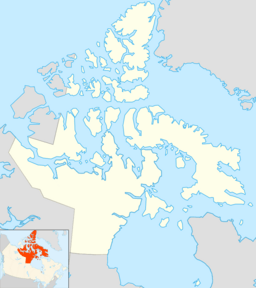McDougall Sound facts for kids
Quick facts for kids McDougall Sound |
|
|---|---|
| Coordinates | 75°15′N 097°30′W / 75.250°N 97.500°W |
| Basin countries | Canada |
| Settlements | Uninhabited |
McDougall Sound is a cool waterway in the Arctic, way up north in Nunavut, Canada. It's like a big channel of water between two islands: Bathurst Island and Cornwallis Island.
This sound connects different parts of the Arctic Ocean. To the south, it opens up to the Parry Channel and then the Barrow Strait. To the north, it leads to Crozier Strait. Many smaller islands are found within McDougall Sound, like Milne Island, Little Cornwallis Island, Wood Island, Neal Islands, Truro Island, and Baker Island. No people live permanently on these islands.
Contents
Who is McDougall Sound named after?
McDougall Sound is named after a brave explorer named George F. McDougall. He explored this area in 1851. At that time, he was part of a team led by Captain Horatio Austin. Their important mission was to search for the lost ships of the Franklin Expedition.
Animals in McDougall Sound
The cold waters of McDougall Sound are home to some amazing Arctic animals.
Bearded Seals
One animal you might find here is the bearded seal. These seals are known for their long whiskers, which look a bit like a beard! They use these whiskers to find food, like small crabs and clams, on the seafloor.
Atlantic Walruses
Giant Atlantic walruses have also been seen as far west as McDougall Sound. Walruses are famous for their long tusks and their loud roars. They are very social animals and often gather in large groups.
Ancient People of McDougall Sound
Long, long ago, people lived in the McDougall Sound area. These were the Paleo-Eskimo people, who lived there even before the Inuit people.
Studying Ancient Life
Scientists have studied the remains of their camps and tools. This helps us learn about how these ancient hunters lived. They found that different groups of Paleo-Eskimo people lived in the area at different times.
Periods of Occupation
- Transitional Period Dorset (around 3,000 years ago): This was an early group of Paleo-Eskimo hunters.
- Early Dorset (2,500 to 2,200 years ago): Another group that lived here for a few centuries.
- Late Dorset (1,500 to 1,000 years ago): The last known group of Paleo-Eskimo hunters in this region.
The University of Calgary has a special project called the McDougall Sound Arctic Research Project. They continue to study the history of these ancient people in the area.
 | Claudette Colvin |
 | Myrlie Evers-Williams |
 | Alberta Odell Jones |


